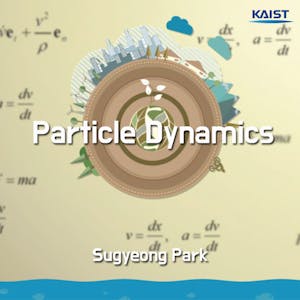This Particle Dynamics course offered by Korea Advanced Institute of Science and Technology(KAIST) delves into the principles of force and motion within mechanical engineering. Through a comprehensive study of dynamics, students will gain a deep understanding of concepts such as work-energy, impulse-momentum, and Newton's 2nd law integration. The course is divided into modules covering various aspects of particle dynamics, including kinematics, Newton's laws, work-energy, impulse-momentum, and more.
Upon completion of the course, students will be equipped with the skills necessary to apply their knowledge of particle dynamics to real-world engineering problems, making them valuable assets in the field of mechanical engineering.
Certificate Available ✔
Get Started / More Info
This Particle Dynamics course is divided into modules covering various aspects of force and motion, including kinematics, Newton's laws, work-energy, impulse-momentum, and more.
The Lecture Note module provides foundational knowledge about particle dynamics to set the stage for deeper understanding.
Module 1-1 Week introduces students to the basics of dynamics, including kinematics in Cartesian and Tangential-Normal coordinates.
Module 1-2 Week further expands on kinematics, covering topics such as kinematics in Polar coordinate and relative motion.
Module 2-1 Week delves into topics such as Free body diagram and Newton's law in linear and rotational motion.
Module 2-2 Week continues the exploration of Newton's laws, covering rotational motion and centripetal force.
Module 3-1 Week focuses on the concept of Work & Energy, exploring its principles and applications.
Module 3-2 Week covers Linear impulse momentum, providing insight into its principles and applications.
Module 4-1 Week delves into Angular impulse momentum and its practical applications.
Module 4-2 Week provides an in-depth understanding of integral of EoM in Polar coordinate, crucial for advanced applications.
Module 5-1 Week covers the Impact of particle, providing insights into its principles and practical applications.
Module 5-2 Week explores the concept of energy loss during collision and its implications in mechanical engineering scenarios.
Module 6-1 Week delves into F=ma, Work-energy, and Impulse-momentum of the systems of particles, providing a comprehensive understanding.
Module 6-2 Week provides practice problems of the kinetics of systems of particles, allowing for practical application of learned concepts.
Module 7-1 Week explores Equations of motion of steady flow and their applications in mechanical engineering scenarios.
Module 7-2 Week provides practice problems of variable mass, allowing for practical application of learned concepts in variable mass systems.
The FINAL TEST module allows students to demonstrate their understanding of the course material and receive a comprehensive evaluation of their knowledge.
Digitalisation in Aeronautics and Space explores the impact of digitalization on aerospace science, covering topics such as artificial intelligence in earth observation,...
Design for Additive Manufacturing equips students with the DFAM staircase framework to make informed decisions about additive manufacturing processes and design...
Introduction to Materials Science provides an insightful look into the impact of materials on society and engineering practice, covering topics from atomic structure...
This specialization equips students with skills to thrive in the autonomous vehicle sector, covering big data management, mechatronic system modeling, and safe autonomous...